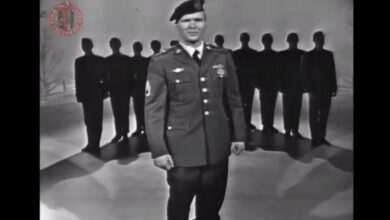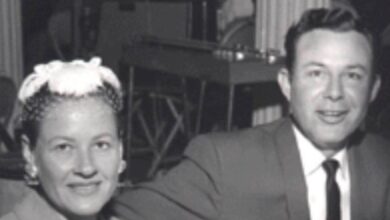Wasn’t Able To Form Sentences, Sang Oh, My. 46 Years On, It Still Echoes
Elvis Presley, born on January 8, 1935, in Tupelo, Mississippi, not only transformed the landscape of popular music but also established a cultural phenomenon that would echo through the ages. Growing up in a poor family, he was introduced to music at a young age, soaking in the sounds of gospel, blues, and country music. His early influences, including the church music of his youth and the rhythm and blues he encountered in Memphis, shaped his unique style, characterized by a blend of vocal prowess and emotional depth. These experiences set the stage for what would become one of the most influential careers in music history.
The pivotal moment of his career came in 1954 when he recorded “That’s All Right” at Sun Records. This single, which showcased an innovative fusion of musical styles, quickly caught the attention of both fans and critics. It is widely regarded as one of the first rock and roll records, highlighting Elvis’s ability to transcend traditional music boundaries. This single was not just a commercial success; it positioned him as a leading figure in a burgeoning movement that would ultimately revolutionize music and youth culture.
Elvis’s rise to fame in the 1950s was meteoric. His distinct vocal style and magnetic stage presence captivated audiences everywhere. Iconic hits such as “Heartbreak Hotel,” “Hound Dog,” and “All Shook Up” further solidified his status as a superstar. In addition to his recordings, his theatrical performances and appearances on television expanded his reach, introducing him to an audience that was hungry for his dynamic artistry. Shows like “The Ed Sullivan Show” were instrumental in building his popularity, as millions of viewers tuned in to witness his electrifying performances, drawing attention not just to his music but also to his charismatic persona, which blended rebellion with charm.
Yet, the pressures of relentless fame and the expectations from the public began to weigh heavily on him. As his career flourished, so did the demands on his time and energy. This overwhelming reality led Elvis down a path where he sought solace in prescription medications and alcohol. His struggles with substance abuse became evident, particularly as the 1960s transitioned into the 1970s. Despite his health challenges, his dedication to his craft and his aides, friends, and fans remained unwavering. Many saw him as a larger-than-life figure who grappled with the vulnerabilities inherent in a career marked by exceptional success.
In this tumultuous period, his personal life also faced significant upheaval, including his divorce from Priscilla Presley in 1973. The split not only affected him emotionally but also impacted his public persona. Yet even amid these challenges, Elvis managed to maintain a sense of connection with his audience. He continued to perform, pouring his heart into every show, illustrating the profound bond he shared with his fans. The dedication he exhibited during his concerts reflected a deep commitment to music as both a form of expression and a means of communication.
By the summer of 1977, however, the toll of his lifestyle and health issues became more pronounced. His final concerts were marked by a palpable sense of urgency and nostalgia as he performed for fans who adored him. Concerts held in cities like Rapid City demonstrated the resilience of his artistry, even when juxtaposed against the struggles he faced. The emotional delivery of songs such as “Are You Lonesome Tonight?” touched the hearts of those who witnessed them, showcasing that even in decline, the remnants of his talent and passion remained potent.
Elvis’s passing on August 16, 1977, sent shockwaves through the entertainment world and beyond. His death sparked an immense outpouring of grief and remembrance from fans and fellow artists alike. In the decades that followed, it became clear that his influence was far from diminished. The songs he wrote and performed continued to inspire countless musicians, bridging generational divides with their timeless appeal. His music has been covered and reinterpreted, reflecting the universal themes of love, heartache, and resilience that define the human experience.
The legacy of Elvis Presley is complex, threaded with themes of triumph and tragedy. It serves as a reminder of the toll that fame can take on an individual, yet also highlights the beauty of artistic expression. The contradictions of his life — a star who brought joy to millions while fighting personal demons — reveal an enduring truth about the nature of celebrity. Elvis, with all his flaws and gifts, embodied the quintessential struggle of the artist: the quest for identity and connection amidst the noise of public life.
Celebrations of Elvis’s life and career continue through music festivals, tribute concerts, and various art forms that commemorate his contributions. His story lives on, capturing the imagination of new generations who discover his incredible catalog. As scholars, fans, and artists engage with his music, the dialogues surrounding his impact on culture only deepen. The tales shared about his life illustrate how music remains a universal language, capable of forging connections that defy time and space.
Ultimately, Elvis Presley’s journey reminds us of the profound relationship between artist and audience, a bond that transcends the boundaries of individual existence. His artistry continues to resonate, cherished by those who find solace and joy in his music. Through the stories shared and the impact felt, the essence of Elvis lives on as a potent symbol of creativity, resilience, and the unbreakable bond formed through the power of music. The legacy he left behind serves not only as a celebration of his extraordinary talent but also as a reflection on the complexities of human experience and the enduring quest for belonging.
&ab_channel=rosikalau





